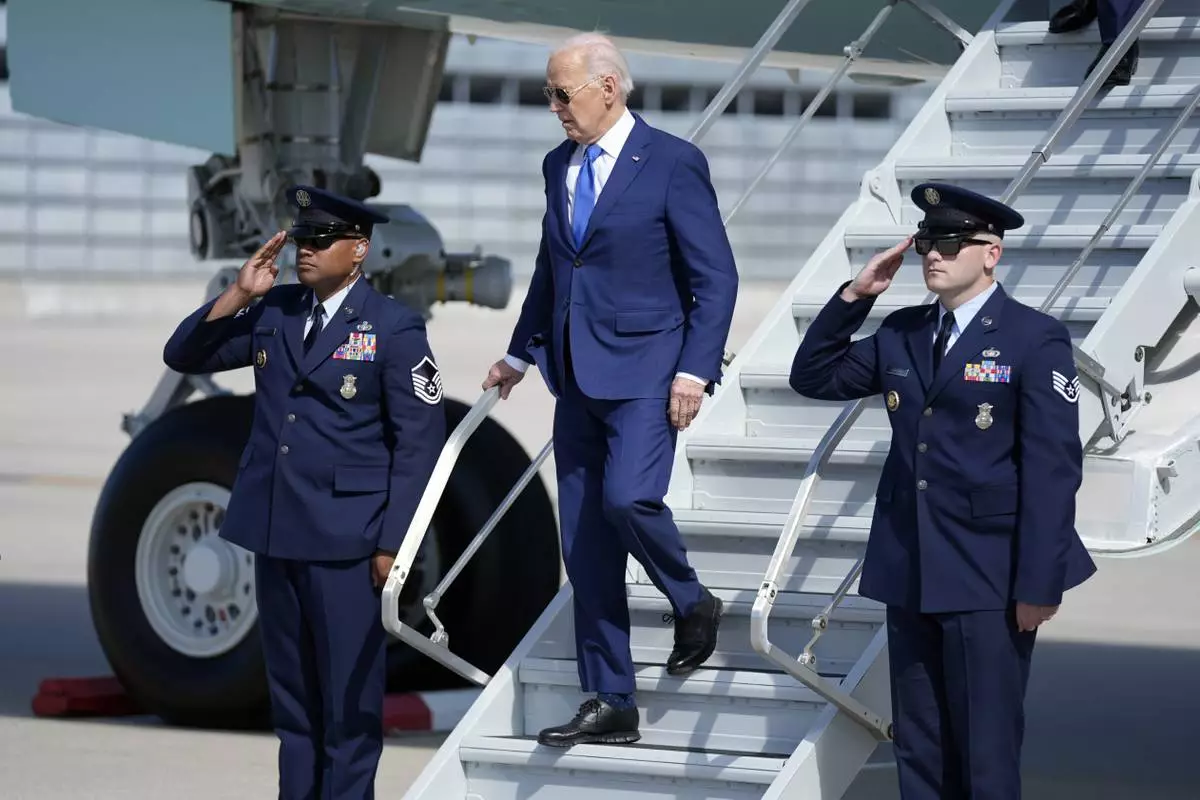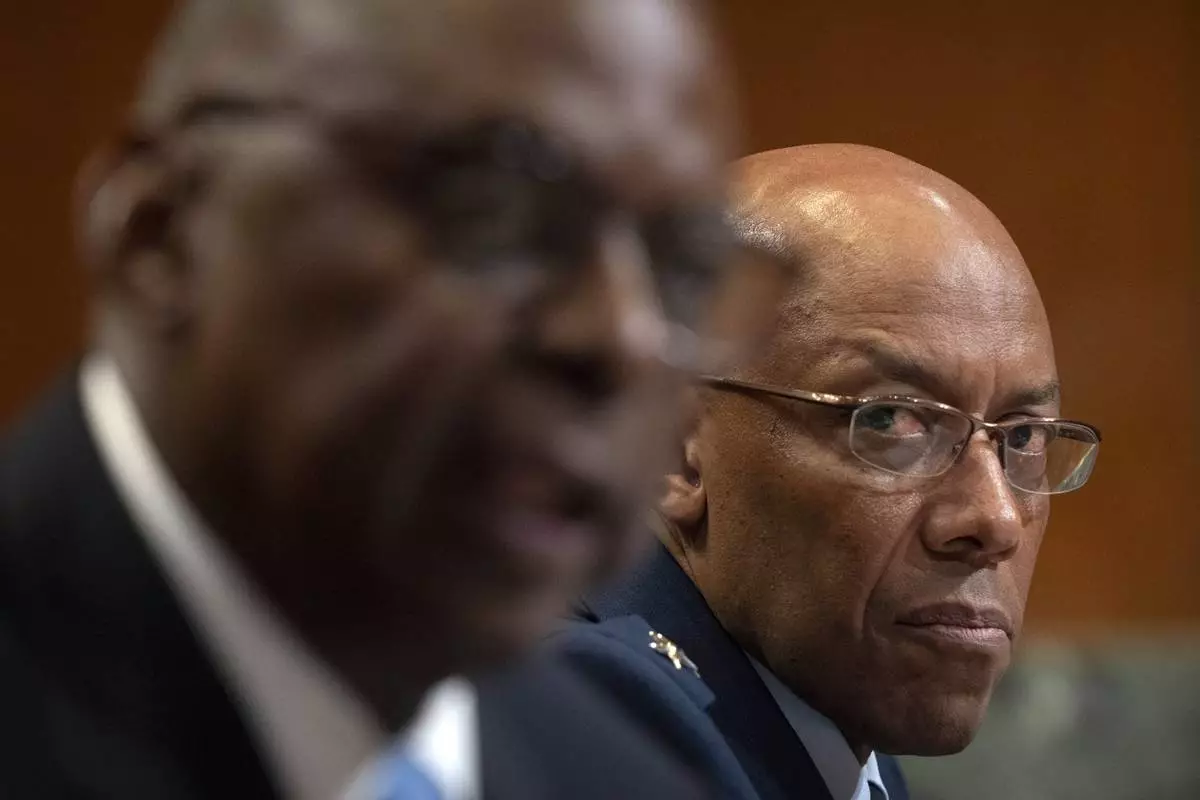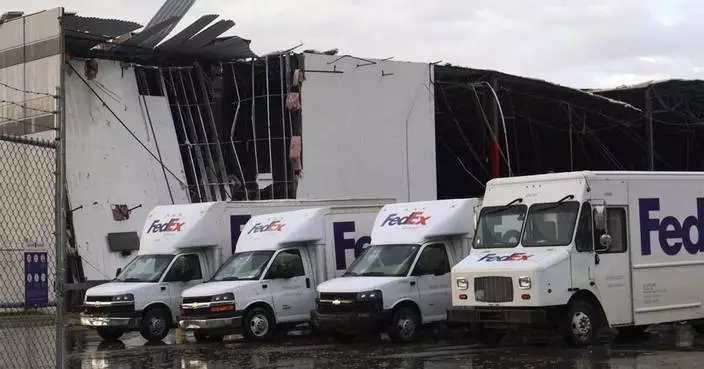President Donald Trump has been on a tear about Google that traces back to a series of unfounded claims about the technology giant circulating among conservatives. Among those claims: that Google interferes with U.S. elections, is biased against conservatives and prefers working with the Chinese military over the Pentagon.
In several tweets issued this August, Trump assailed Google for alleged electoral interference and again brought up claims of its alleged secret involvement with the Chinese government. On Monday, the president reiterated a baseless claim that Google had "manipulated " the 2016 election in favor of Hillary Clinton, which his campaign's Twitter feed also picked up .
All of these claims emerged from reports and commentary from conservative pundits and Trump supporters, none backed by convincing evidence. Google has also denied them.

FILE - In this May 1, 2019, file photo a man walks past a Google sign outside with a span of the Bay Bridge at rear in San Francisco. President Donald Trump has been on a tear about Google that traces back to unfounded conspiracy theories about the technology giant, unproven claims by former Google employees and a small research study that the president misconstrued. (AP PhotoJeff Chiu, File)
"Distorting results for political purposes would harm our business and go against our mission of providing helpful content to all of our users," Google spokeswoman Julie Tarallo said.
Here's where these claims emerged and what's known about them.
ELECTION INTERFERENCE
On Aug. 6, Trump implicitly suggested that Google had favored Clinton's 2016 campaign over his and that the company planned to "illegally subvert" the 2020 election as well. On Monday he made the first part explicit , referencing an unspecified study that, he claimed, showed that "Google manipulated from 2.6 million to 16 million votes for Hillary Clinton in 2016 Election."
Trump won the presidency with an Electoral College majority but lost the popular tally to Clinton by almost 2.9 million votes. Trump has falsely insisted for years that he actually won the popular vote.
The president's campaign Twitter feed suggested Monday that Trump referenced a 2017 study by psychologist Robert Epstein that found Google showed more pro-Clinton results to undecided voters than pro-Trump results. Google and others have questioned the methodology of the study, which was not peer reviewed by other researchers.
In its final paragraph, the four-page study extrapolated experimental findings from a small group of 21 undecided voters to the electorate as a whole using mathematical models Epstein reported in an earlier paper. Reached by phone, Epstein said his results only showed that search results were biased toward Clinton, not that Google was doing so intentionally to sway elections.
Epstein also noted that those extrapolated findings suggested a pro-Clinton vote shift of 2.6 million to 10 million votes, not the 16 million cited by Trump.
Even that may be too much of a stretch, said Ramesh Srinivasan, an information-studies professor at UCLA, who noted that the study's finding of alleged search-result bias doesn't account for other possible influences on voters. "We can't jump to conclusions that it gave any a candidate millions of votes," he said.
Like other researchers, Epstein and Srinavasan emphasize that they remain concerned about the opacity of tech platforms like Google and Facebook and their unbridled power to influence elections.
CONSERVATIVE BIAS
In his early August tweets, Trump singled out former Google engineer Kevin Cernekee, who claims Google fired him for posting Republican viewpoints on internal message boards. Google said Cernekee was fired for downloading confidential company documents onto a personal device.
Cernekee apparently drew Trump's attention after he told Fox News host Tucker Carlson on Aug. 2 that Google executives "really want Trump to lose in 2020. That's their agenda." Cernekee offered no evidence for his claim.
"The statements made by this disgruntled former employee are absolutely false," Google's Tarallo said.
Cernekee's situation reflects a larger belief among conservatives that major platforms such as Google and Facebook are biased against conservative viewpoints, both internally and on their public services. Republican legislators have convened several hearings on the subject.
But experts say there's little evidence to support such claims, which the companies themselves have long denied.
"Trump wants to remind (big tech) that he is watching them," said Frank Pasquale, a law professor at the University of Maryland and an expert on algorithms and society. He pointed out that some also claim that Google-owned YouTube funnels viewers to far-right videos and conspiracy theories.
All these allegations, Pasquale said, "assume that neutrality or objectivity means having half negative and half positive results." But if more negative pages about a person or topic exist on the web, he said, a search result will likely produce more negative results.
Cernekee's personal situation may also be more complex than it first appeared. On Aug. 5, the conservative publication The Daily Caller published posts Cernekee made on Google message boards in which he called for a fund to help white nationalist Richard Spencer after he was punched by a protester.
Cernekee told The Associated Press in a statement that he has "always supported free speech and opposed white nationalism," and that he spoke in opposition to other employees who supported Spencer getting punched.
GOOGLE AND CHINA
Trump also indirectly referred on Aug. 6 to another unfounded claim gaining currency among conservatives, which is that Google is spurning the U.S. military and instead working with the Chinese. In mid-July, he tweeted about unsupported claims to that effect by technology investor Peter Thiel, a Trump supporter who is also a board member of Google rival Facebook.
In an appearance on Fox News , Thiel offered no proof for claims that Google is working with the Chinese government on artificial intelligence projects and has "likely" been infiltrated by Chinese agents.
Google left China in 2010, and confirmed this summer in a congressional hearing that it shut down an experimental program to relaunch a censored version of its search service in the country. Under pressure from its employees, it has also withdrawn from at least one Pentagon contract.
Google said it has not been infiltrated, and executive Karan Bhatia denied Thiel's claims in a congressional hearing last month, saying "We take extremely seriously the threat of any penetration of our systems."
Google does have an AI office in China, which it positioned as a way to employ Chinese engineers who specialize in AI research. Thiel wrote in a New York Times opinion piece that Google's close AI ties in China are bad for the U.S.
Google said it still works with the Defense Department on other projects, including cybersecurity. And it denies working with the Chinese military.
Others in Trump's administration have said Google's work in China isn't problematic. "I think they're working for our military, for America, not for China," Larry Kudlow, director of the National Economic Council, said on Fox News last month.
WASHINGTON (AP) — President Joe Biden said Wednesday that he would not supply offensive weapons that Israel could use to launch an all-out assault on Rafah — the last major Hamas stronghold in Gaza — over concern for the well-being of the more than 1 million civilians sheltering there.
Biden, in an interview with CNN, said the U.S. was still committed to Israel's defense and would supply Iron Dome rocket interceptors and other defensive arms, but that if Israel goes into Rafah, “we’re not going to supply the weapons and artillery shells used, that have been used.”
The interview marked Biden's toughest public comments yet about the potential Israeli military operation and followed his decision to pause a shipment of heavy bombs to Israel last week over concerns that the U.S. ally was moving closer to an attack on Rafah despite public and private warnings from his administration.
THIS IS A BREAKING NEWS UPDATE. AP’s earlier story follows below.
WASHINGTON (AP) — The Biden administration paused a shipment of bombs to Israel last week over concerns that the country was approaching a decision on launching a full-scale assault on the southern Gaza city of Rafah against the wishes of the United States, Defense Secretary Lloyd Austin said Wednesday.
The shipment was supposed to consist of 1,800 2,000-pound (900-kilogram) bombs and 1,700 500-pound (225-kilogram) bombs, according to the official who spoke on the condition of anonymity to discuss the sensitive matter. The focus of U.S. concern was the larger explosives and how they could be used in a dense urban setting like Rafah where more than 1 million civilians are sheltering after evacuating other parts of Gaza amid Israel’s war on Hamas, which came after the militant group’s deadly attack on Israel on Oct. 7.
Austin confirmed the weapons delay, telling the Senate Appropriations subcommittee on defense that the U.S. paused “one shipment of high payload munitions.”
“We’re going to continue to do what’s necessary to ensure that Israel has the means to defend itself,” Austin said. “But that said, we are currently reviewing some near-term security assistance shipments in the context of unfolding events in Rafah.”
The U.S. has historically provided enormous amounts of military aid to Israel. That has only accelerated in the aftermath of Hamas’ Oct. 7 attack that killed some 1,200 in Israel and led to about 250 being taken captive by militants. The pausing of the aid shipment is the most striking manifestation of the growing daylight between Israel Prime Minister Benjamin Netanyahu’s government and the administration of Democratic President Joe Biden, which has called on Israel to do far more to protect the lives of innocent civilians in Gaza.
It also comes as the Biden administration is due to deliver a first-of-its-kind formal verdict this week on whether the airstrikes on Gaza and restrictions on delivery of aid have violated international and U.S. laws designed to spare civilians from the worst horrors of war. A decision against Israel would further add to pressure on Biden to curb the flow of weapons and money to Israel’s military.
Biden signed off on the pause in an order conveyed last week to the Pentagon, according to U.S. officials who were not authorized to comment on the matter. The White House National Security Council sought to keep the decision out of the public eye for several days until it had a better understanding of the scope of Israel’s intensified military operations in Rafah and until Biden could deliver a long-planned speech on Tuesday to mark Holocaust Remembrance Day.
Biden’s administration in April began reviewing future transfers of military assistance as Netanyahu’s government appeared to move closer toward an invasion of Rafah, despite months of opposition from the White House. The official said the decision to pause the shipment was made last week and no final decision had been made yet on whether to proceed with the shipment at a later date.
U.S. officials had declined for days to comment on the halted transfer, word of which came as Biden on Tuesday described U.S. support for Israel as “ironclad, even when we disagree.”
Press secretary Karine Jean-Pierre declined to square the arms holdup with Biden’s rhetoric in support of Israel, saying only, “Two things could be true.”
Israel’s ambassador to the United Nations, Gilad Erdan, in an interview with Israeli Channel 12 TV news, said the decision to pause the shipment was “a very disappointing decision, even frustrating." He suggested the move stemmed from political pressure on Biden from Congress, the U.S. campus protests and the upcoming election.
The decision also drew a sharp rebuke from House Speaker Mike Johnson and Senate Republican Leader Mitch McConnell, who said they only learned about the military aid holdup from press reports, despite assurances from the Biden administration that no such pauses were in the works. The Republicans called on Biden in a letter to swiftly end the blockage, saying it “risks emboldening Israel's enemies,” and to brief lawmakers on the nature of the policy reviews.
Biden has faced pressure from some on the left — and condemnation from the critics on the right who say Biden has moderated his support for an essential Mideast ally.
“If we stop weapons necessary to destroy the enemies of the state of Israel at a time of great peril, we will pay a price,” said Sen. Lindsey Graham, R-S.C., his voice rising in anger during an exchange with Austin. “This is obscene. It is absurd. Give Israel what they need to fight the war they can’t afford to lose.”
Independent Sen. Bernie Sanders of Vermont, a Biden ally, said in a statement the pause on big bombs must be a “first step.”
“Our leverage is clear,” Sanders said. “Over the years, the United States has provided tens of billions of dollars in military aid to Israel. We can no longer be complicit in Netanyahu’s horrific war against the Palestinian people.”
Austin, meanwhile, told lawmakers that "it’s about having the right kinds of weapons for the task at hand.”
"A small diameter bomb, which is a precision weapon, that’s very useful in a dense, built-up environment,” he said, “but maybe not so much a 2,000-pound bomb that could create a lot of collateral damage.” He said the U.S. wants to see Israel do “more precise” operations.
Israeli troops on Tuesday seized control of Gaza’s vital Rafah border crossing in what the White House described as a limited operation that stopped short of the full-on Israeli invasion of the city that Biden has repeatedly warned against on humanitarian grounds, most recently in a Monday call with Netanyahu.
Israel has ordered the evacuation of 100,000 Palestinians from the city. Israeli forces have also carried out what it describes as “targeted strikes” on the eastern part of Rafah and captured the Rafah crossing, a critical conduit for the flow of humanitarian aid along the Gaza-Egypt border.
Privately, concern has mounted inside the White House about what’s unfolding in Rafah, but publicly administration officials have stressed that they did not think the operations had defied Biden’s warnings against a widescale operation in the city.
The State Department is separately considering whether to approve the continued transfer of Joint Direct Attack Munition kits, which place precision guidance systems onto bombs, to Israel, but the review didn’t pertain to imminent shipments.
The U.S. dropped the 2,000-pound bomb sparingly in its long war against the Islamic State militant group. Israel, by contrast, has used the bomb frequently in the seven-month Gaza war. Experts say the use of the weapon, in part, has helped drive the enormous Palestinian casualty count that the Hamas-run health ministry puts at more than 34,000 dead, though it doesn’t distinguish between militants and civilians.
The U.S.-Israel relationship has been close through both Democratic and Republican administrations. But there have been other moments of deep tension since Israel's founding in which U.S. leaders have threatened to hold up aid in attempt to sway Israeli leadership.
President Dwight Eisenhower pressured Israel with the threat of sanctions into withdrawing from the Sinai in 1957 in the midst of the Suez Crisis. Ronald Reagan delayed the delivery of F16 fighter jets to Israel at a time of escalating violence in the Middle East. President George H.W. Bush held up $10 billion in loan guarantees to force the cessation of Israeli settlement activity in the occupied territories.
__
Associated Press writers Josef Federman in Jerusalem and Lolita C. Baldor and Matthew Lee contributed to this report.

President Joe Biden arrives at Chicago O'Hare International Airport to attend a political fundraiser, Wednesday, May 8, 2024, in Chicago. (AP Photo/Evan Vucci)

Chairman of the Joint Chiefs of Staff Air Force Gen. CQ Brown, right, listens as Secretary of Defense Lloyd Austin, left, speaks during a hearing of the Senate Appropriations Committee Subcommittee on Defense on Capitol Hill, Wednesday, May 8, 2024, in Washington. (AP Photo/Mark Schiefelbein)

Protestors opposed to the war between Israel and Hamas stand before a hearing of the Senate Appropriations Committee Subcommittee on Defense with Secretary of Defense Lloyd Austin and Chairman of the Joint Chiefs of Staff Air Force Gen. CQ Brown on Capitol Hill, Wednesday, May 8, 2024, in Washington. (AP Photo/Mark Schiefelbein)

Sen. Lindsey Graham, R-S.C., speaks during a hearing of the Senate Appropriations Committee Subcommittee on Defense with Secretary of Defense Lloyd Austin and Chairman of the Joint Chiefs of Staff Air Force Gen. CQ Brown on Capitol Hill, Wednesday, May 8, 2024, in Washington. (AP Photo/Mark Schiefelbein)

Protestors opposed to the Israel-Hamas war are escorted out as Secretary of Defense Lloyd Austin, left, speaks during a hearing of the Senate Appropriations Committee Subcommittee on Defense on Capitol Hill, Wednesday, May 8, 2024, in Washington. (AP Photo/Mark Schiefelbein)

Secretary of Defense Lloyd Austin attends a hearing of the Senate Appropriations Committee Subcommittee on Defense on Capitol Hill, Wednesday, May 8, 2024, in Washington. (AP Photo/Mark Schiefelbein)

White House press secretary Karine Jean-Pierre speaks during a briefing at the White House, Tuesday, May 7, 2024, in Washington. (AP Photo/Evan Vucci)

President Joe Biden speaks at the U.S. Holocaust Memorial Museum's Annual Days of Remembrance ceremony at the U.S. Capitol, Tuesday, May 7, 2024 in Washington. (AP Photo/Evan Vucci)

Pentagon chief confirms US has paused bomb shipment to Israel to signal concerns over Rafah invasion

Pentagon chief confirms US has paused bomb shipment to Israel to signal concerns over Rafah invasion

Smoke rises following an Israeli airstrike east of Rafah, Gaza Strip, Monday, May 6, 2024. (AP Photo/Ismael Abu Dayyah)





















